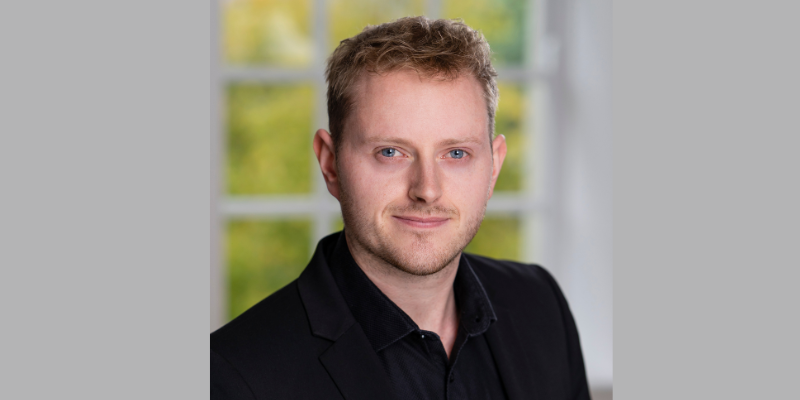In This Section
Planning communities for all: Q&A with Ciaran Dineen, Planning Consultant

- UCC BSc in Government and Political Science and MPlan graduate Ciaran Dineen shares his journey to becoming a Planning Consultant.
- Ciaran shares how his work as a Planning Consultant allows him to play a vital role in creating vibrant, inclusive communities.
Welcome to UCC Alumni Series where we spotlight the inspiring journeys of our graduates who are making their mark in diverse fields.
In this edition, we chat with Ciaran Dineen, a Planning Consultant with McCutcheon Halley Chartered Planning Consultants.
Ciaran graduated from University College Cork with a first-class honours BSc degree in Government and Political Science, before pursuing a postgraduate Masters in Planning and Sustainable Development (MPlan).
Here, Ciaran insights into his career path so far, his time at UCC, and his advice for students considering a future in planning and sustainable development.
Your undergraduate degree in Government and Political Science laid the foundation for your career in planning. What inspired you to pursue the Masters in Planning and Sustainable Development at UCC, and how did it build on the skills and knowledge you gained in your BSc?
I was lucky in that during my 3rd year of studying Government and Political Science there was a module option about the Irish Planning System, taught by Dr Aodh Quinlivan. It was during the lectures that I quickly realized that planning was something that I found really interesting, and that module gave me a taster as to what the Masters in Planning and Sustainable Development (MPlan) might be like.
After experiencing work placement with a local newspaper, The Carrigdhoun, in which I attended Cork County Council meetings, the topic of planning was almost always on the agenda in one form or another and I was fascinated with how it interconnected with so many aspects of politics and society. Before entering my final year of the undergraduate degree, I knew that MPlan was for me.
Planning and sustainable development are vital fields in addressing modern challenges like urbanisation and climate change. How did the MPlan at UCC prepare you to tackle these issues in your work as a planning consultant?
The benefit of having a two-year Masters like the MPlan is that it allows you to explore a range of topics and areas which can give you a much broader sense as to how the planning discipline interacts with a wide variety of issues experienced in society. The MPlan tackles some of these contemporary talking points, but not just in isolation, rather as individual challenges which must be considered alongside competing interests. The role of a planner is to weigh up these competing interests with the goal of coming to a decision or recommendation that is in the best interests of the overall common good. Challenges like urbanisation and climate change are just a sample of topics discussed as part of a rounded outlook on planning and society, which prepares you to come to informed conclusions, taking into account a wide range of considerations.
In your current role as a planning consultant at McCutcheon Halley Chartered Planning, what aspects of your work do you find most fulfilling?
The most fulfilling work that I do is knowing that the projects I am often involved in will result in families establishing roots in new communities, or maintaining relationships with them, through the provision of housing developments. At a time when home ownership rates are declining and younger people find that the property ladder has been pulled up from them, playing a small role in the delivery of homes for a range of different members of society with diverse backgrounds and needs is something that I am incredibly passionate about. Going past sites that have become neighbourhoods, with children playing and people interacting with one another, fuels the passion I have for planning and forces me to recognize the responsibility I have in ensuring that people have an opportunity to access a high-quality living environment.
For prospective Humanities students considering the Masters in Planning and Sustainable Development at UCC, what advice would you give about preparing for the programme and making the most of opportunities at university?
In life I believe that you reap what you sow and experiences within University are no different. You get out what you put in and there is a great opportunity to develop new skills and foster long-term relationships which can benefit you throughout your career if you are willing to engage. Joining societies and clubs is a great way of meeting new people, and you never know who you might meet and what relationship you might strike up. I would always advocate for getting involved in student media as this can be a great way of developing critical thinking and creativity, whilst also perhaps placing you outside your comfort zone.
In terms of prospective MPlan students, the best advice I would give would be to embrace all topics and themes of the course which are taught as you will likely encounter each area at least at some point, and in some form, of your professional planning career. Moreover, you are duty bound as a planner to respect the range of competing interests within the discipline to make you a well-rounded adjudicator of complex social issues.
Postgraduate study at UCC
UCC will be host its 2025 Postgrad Expo on Wednesday 29 January from 1-5 pm in the Hub. Come along and find out about the MA in Planning and Sustainable Development (MPlan) and other postgraduate programmes at UCC.
College of Arts, Celtic Studies & Social Sciences
Coláiste na nEalaíon, an Léinn Cheiltigh agus na nEolaíochtaí Sóisialta
Contact us
College Office, Room G31 ,Ground Floor, Block B, O'Rahilly Building, UCC
